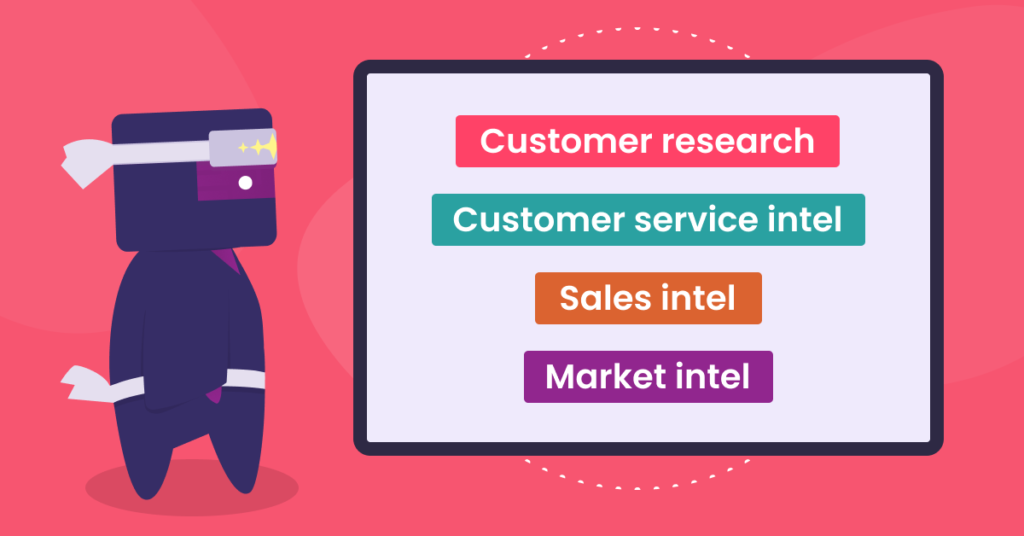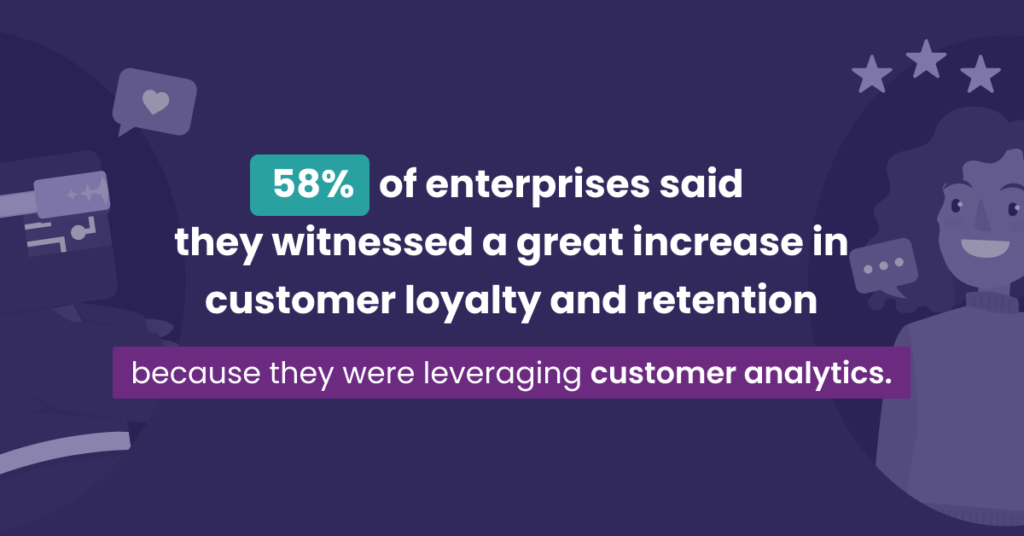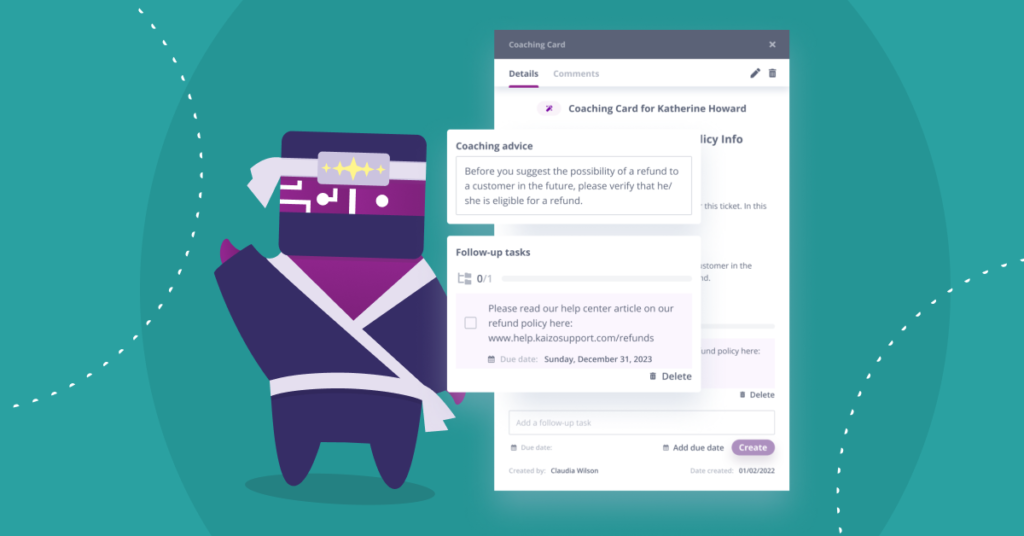Customer intelligence is, in a way, akin to military reconnaissance — you study the ground to find a way to win it.
Imagine a world where you could actually see what your customers want before they even knew it themselves. How would that change your business? That’s the idea behind customer intelligence, and it’s not as far off as you might think.
Studying how your customers interact with your company, its products and services, and your competitors can reveal a wealth of information. When combined with other forms of data, this information can help you predict trends and make better business decisions.
But here’s one important thing to remember. Customers don’t just prefer personalized experiences — they expect them.
They want brands to be aware of their prior exchanges with the company, preferences, special requests, problems, etc. To put it bluntly, in order to beat the competition, you need to guess/know what your customers need even if they don’t know it themselves. And for that, you need customer intelligence.
What is customer intelligence?
Customer intelligence is an approach to understanding customers based on data-driven insights. It’s about using data to understand your customers on a deeper level and deliver exceptional experiences that make them feel valued.
In most cases, it is the data and insights you get from your customer interactions, even if those interactions are negative reviews. A review is still feedback, right?
You can also get that data by surveying your customers, doing market research, or simply going through customer conversations and chat metrics. This is one of the sources where you can get the information you need to make decisions that will help your business grow and succeed.
Read more: Top 5 chat metrics and ways to improve them
In other words, customer intelligence management is the process of gathering information about customers and then using that information to improve your products and customer service quality, create new products and services, or even build a business around your customers.
And the most successful businesses are those that are doing just that. After all, a recent report by Zendesk found that 66% of buyers expect personalization from brands.

There are four different kinds of customer intelligence:

Customer research. This is the most basic form of customer intelligence. It involves talking to your customers and finding out what they like and dislike about your products, services, or website.
Customer service intel. Agents are your touchpoint with the customer. They represent the brand and get to experience first-hand how buyers interact with your product or services. The customer relationship intelligence your agents provide based on their interactions with customers is a goldmine so be sure to develop strong customer service processes to gather customer intelligence data effectively.
Read more: How to improve your customer service process
Sales intel. Some companies focus on segmenting their customers and figuring out which ones will buy the most and which ones value price over other factors when it comes to choosing a product or service. With this knowledge in hand, they can figure out how much they need to spend on advertising, or they can target their marketing in smarter ways.
Market intel. Companies use market intel to figure out how their competitors are doing — whether their ads are working or whether competitors are gaining an edge in pricing or quality — so that they can take advantage of opportunities before competitors do.
Why is customer intelligence important?
As companies have become more customer-centric and competitive, the amount of data available has grown exponentially. But having a lot of data doesn’t mean much if you don’t know what to do with it or how to use it. That’s where customer intelligence comes into play.
84% of executives agree that customer experience and customer-centric strategies hold definitive value for businesses, yet only 14% of them are actually going strong in that area.
In another research, 58% of enterprises said they witnessed a great increase in customer loyalty and retention because they were leveraging customer analytics.

But in simple terms, you need to have a strong customer intelligence strategy because it tells you what your customers want, how they buy, and what they think of your company, products and customer service levels. It can show you where the gaps are in customer satisfaction. Customer intelligence helps you understand your customers better so you can give them what they want when they want it.
But let’s look at the why in more detail.
It will help you service your customers well
Customer intelligence can help you identify weaknesses in your customer service, things you can coach and improve to provide better experiences to both your internal and external customers.
Read more: How to improve customer experience
It will help you build a better product
Understanding your customers means that you can speak to their needs and wants in the exact way they’re thinking about them. This allows you to build a product that really solves what your customers need.
It will help you sell more
The most effective salespeople are those who can deliver pitches that are specific to each prospect’s pain points. In order to do this, they need a deep understanding of each customer’s individual interests, challenges and business goals.
It will help you retain your customers
Customer intelligence helps inform which product features are most useful for different customer types, so you can build out custom experiences — rather than “one-size-fits-all” support experience—that is ideal for each account type.
It will help attract new customers
What’s the point of building an amazing product if nobody knows about it? Once you know who your dream customers are and why they choose to buy from you, it’s much easier to understand where to find them and how to reach them with messaging they’ll be inspired by.
How to develop customer intelligence in customer service

Customer intelligence is most often thought of in terms of market research. And it’s true that customer intelligence is a critical step for any marketing campaign. But it’s also an important vehicle for growth in other departments, especially product development and customer service.
Among the most common customer intelligence examples is this: you can use the data you gather to provide a more personalized experience for each support interaction.
But how do you do this? Here is a step-by-step guide.
Step 1. Build your customer intelligence strategy
The first step to creating a solid plan is to decide what information will help you deliver better support experiences, and how it can be collected — this is going to be your customer intelligence system, aka plan of action.
Step 2. Collect customer intelligence data
This could include recording phone calls, collecting feedback from questionnaires or surveys, or using other customer interaction data points like tweets or social media posts. If you have an omnichannel contact center, make sure all of your channels are being recorded so that the entire customer journey is captured. Then, you can use customer intelligence tools to process and rate those calls to further coach your agents.
Step 3. Analyze interactions and data
Listen to recorded calls and read over surveys carefully—perhaps even have different people analyze them separately so that each agent can bring new insights to the table—so that any recurring problems can be addressed easily by your team going forward.
Step 4. Coach your agents
Leverage coachable moments and create actionable items for agents based on this analysis in order to improve their abilities as well as their performance in future interactions with customers. Do your agents lack empathy? Do they need more training in efficiency? Using all the available customer intelligence platforms will not just help you build a better product — it will help you build better customer support teams.
Read more: Everything you need to know about customer service coaching
For example, you could analyze customer interactions and then use them to give your agents specific Coaching Cards, explaining what they need to improve, how and why.

Step 5. Learn to predict customer needs
At the end of the day, it is prescient customer service that takes the case. You need to answer questions before they get asked. Resolve tickets before they get created. In other words, do some customer service magic.
Try to predict needs before they arise by addressing common problems preemptively with proactive service strategies. For example, by updating your FAQs or creating chat bots). Address any issues as soon as they come up so that they don’t become chronic problems down the road.
Step 6. Invest in customer intelligence software
Choosing the right software will depend on your customer intelligence definition and the source you want to generate it. In case it is your customer service teams that you rely on, your team leads will need a tool for them to analyze customer interactions, rate them, and give agents feedback on what needs to be improved. This is how you don’t just gather customer intelligence data but use it to the benefit of your business.
There is a lot of top-notch data out there for you to use, but how does it get used? That’s where the challenge lies for most companies. They haven’t developed any processes that allow them to capitalize on the knowledge. They don’t have any systems in place for capturing, storing or analyzing the data. And if they do, does that data actually bring about change in the way their customer service trams function and the customer experience they create?




